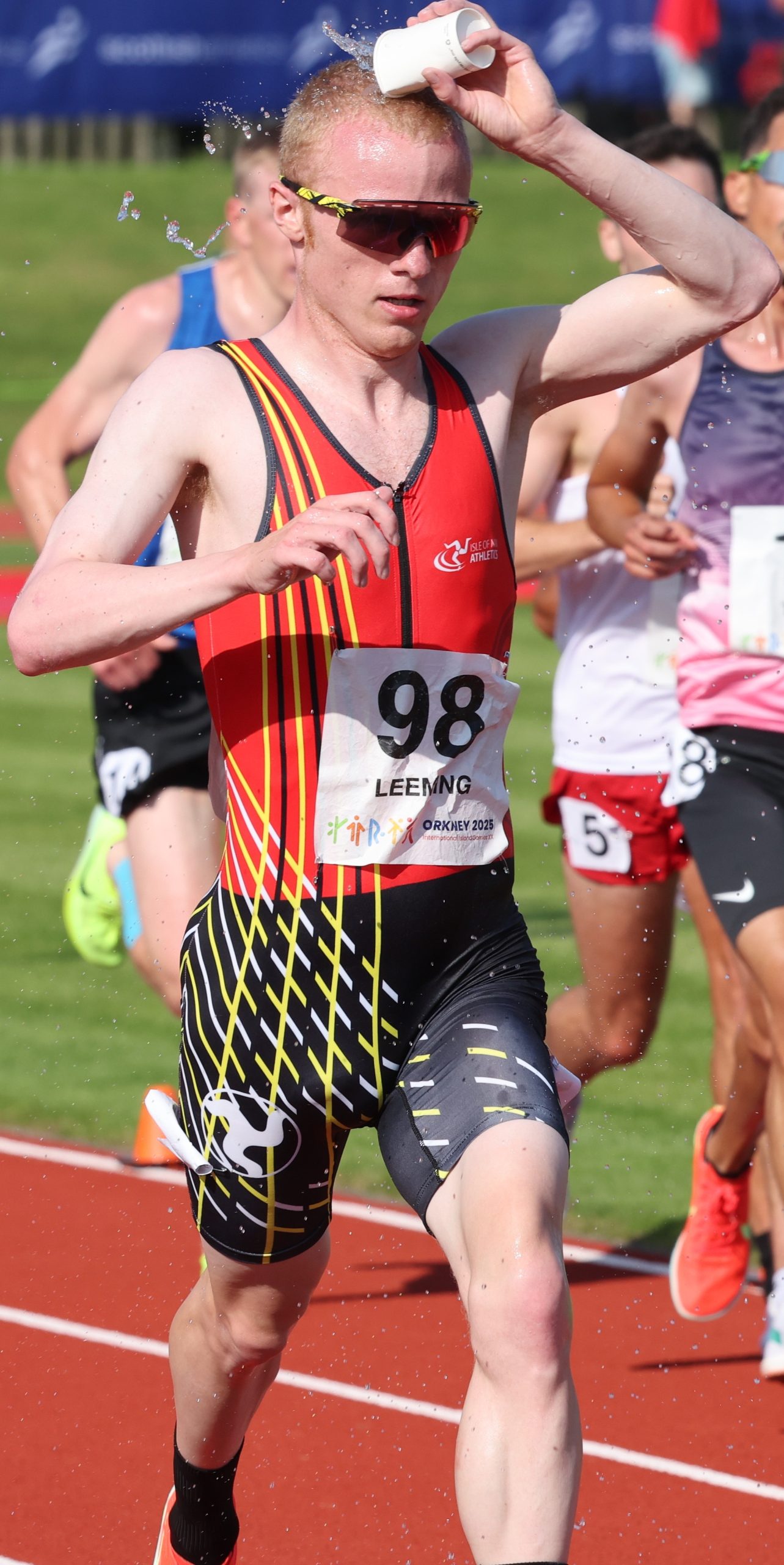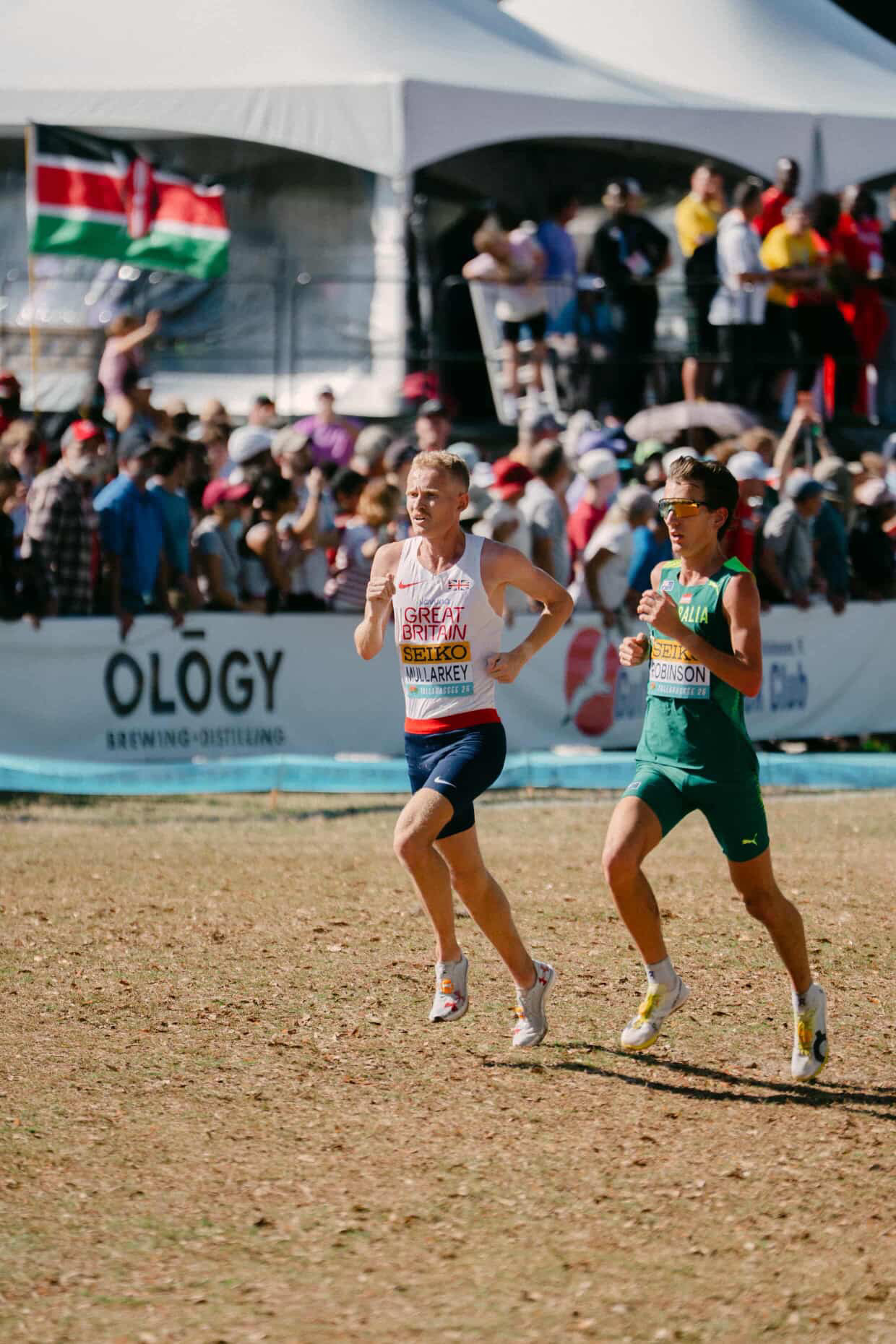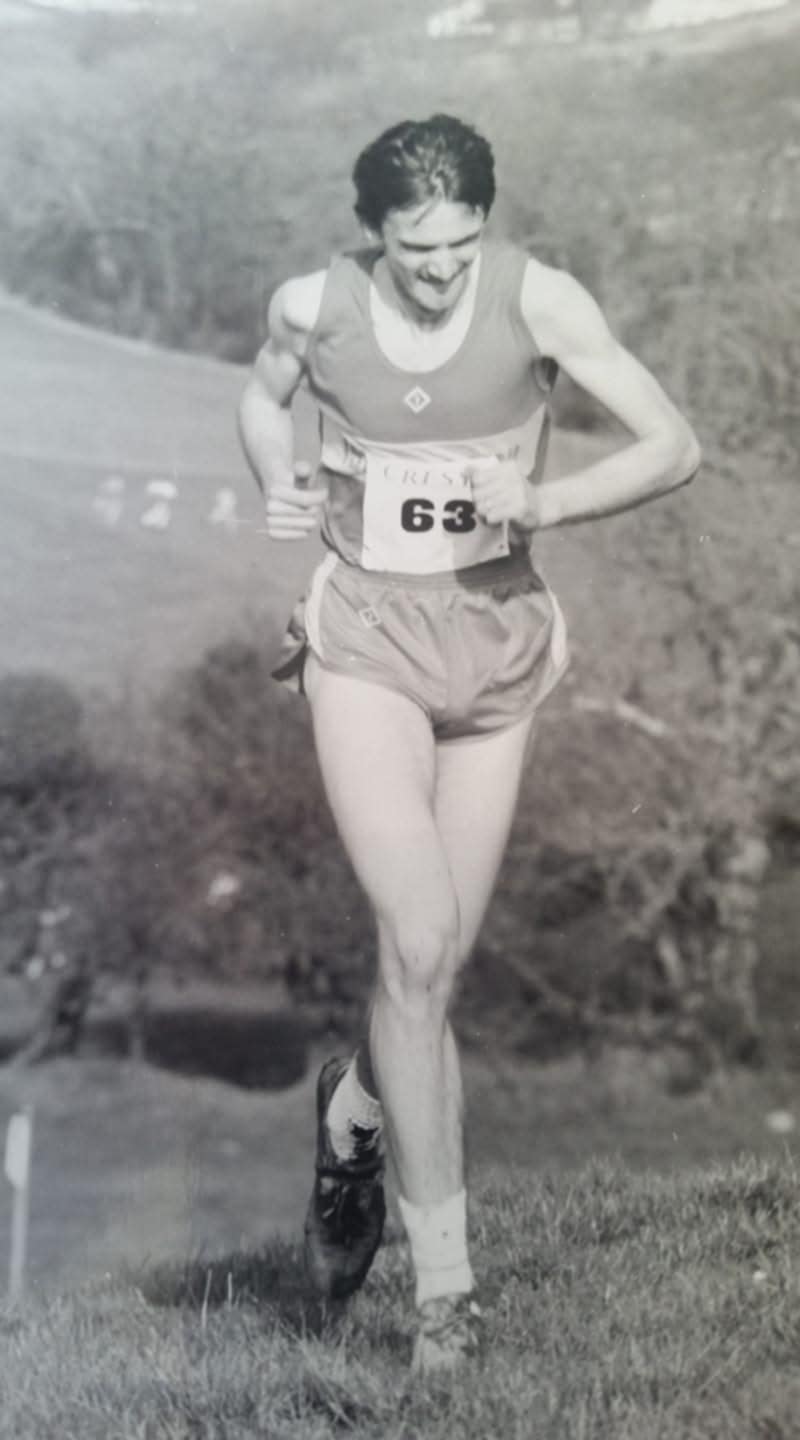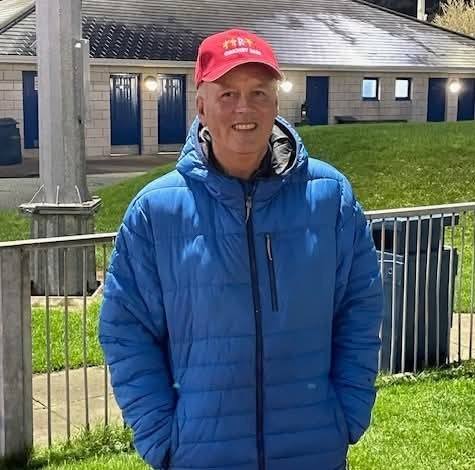Corrin Leeming – Q&A
A conversation with one of the Isle of Man’s most versatile endurance athletes — from the roads to the track, and from cycling to running success, Corrin Leeming continues to raise the standard of Manx distance running.
Background & Beginnings
How did you first get involved in sport — was it running or cycling that came first?
I started cycling first at Dot’s NSC league, and always really enjoyed that. With Dot and the team, I had the fantastic opportunity to race all over Britain and Ireland. I started doing the local XC league when I was about 12, but other than that I never did any other running growing up. During lockdown in 2021, I first started to run properly. I then decided to start trying to race locally, and discovered that I really enjoy it.
Was there a moment or race where you realised you had real potential as a runner?
For me the 2023 Island Games in Guernsey felt like a turning point. I won the half marathon and got silver in the 10,000m whilst still balancing triathlon. It left me intrigued about where my running potential could be if I solely focused upon it.
You’ve represented the Isle of Man across multiple disciplines — what does that mean to you?
It is always a proud feeling to represent the Island. Not many people get the opportunity to do it at all, and I’m so grateful to have had the support across cycling, triathlon, and running.
Training & Preparation
You’ve made huge progress over the past couple of seasons. What changes or key focuses in your training have helped you reach this level?
In the past I have quite often struggled to find the right balance with training, and have quite often managed to tip myself into overtraining, because I simply enjoy the training. I now make sure I have 3 key interval sessions for the week, with the remaining sessions all being in zone 2. Pre-planning the intensity for each week helps me to prevent overtraining, and ensures I approach each key session relatively fresh.
How do you approach your training structure — do you follow a set plan or work around how you feel each week?
I am self coached- I did sports science at University, and enjoy learning about theory behind training, so the idea of coaching myself was always appealing. I set a plan a few weeks in advance, but make sure the plan is adaptable depending on how the body is responding.
What does a typical training week look like for you right now?
Monday – Recovery run (AM) and ride (PM)
Tuesday – Run session (AM) and zone 2 ride (PM)
Wednesday – Zone 2 run (AM) and zone 2 ride (PM)
Thursday – Run session (AM) and zone 2 ride (PM)
Friday – Recovery ride (PM)
Saturday – Zone 2 Ride and Zone 2 Run
Sunday – Run session and Zone 2 Ride
How do you balance cycling and running — are you still doing both, or is your focus now entirely on running?
My focus is now firmly on running. All intensity throughout the week is completed on foot, and then I am using the bike for aerobic endurance work with limited mechanical load.
Have you ever considered taking on triathlon, given your background in both sports?
I did start to focus on triathlon in 2022 and 2023. Although when doing so I discovered I gained greater enjoyment through just running. I also didn’t find the racing as enjoyable in triathlon. I felt training across all three whilst working made it hard to maximise my potential in any of the given disciplines.
What are some of the biggest challenges of training on the Isle of Man, and how do you make it work?
After spending 3 years at Loughborough University and then moving back home I have discovered I actually find it easier training on the Island. At home you know all the roads, so it is easier to decide upon suitable routes for specific sessions. Facilities also tend to be less busy and more user friendly. At Loughborough you had to book a swimming session a week in advance if you wanted to use the pool! The roads are also a lot quieter on the Island, and there are areas of all the different terrains!
Racing & Achievements
2025 has been an incredible year — Island Games 10,000m and Half Marathon champion, sub-30 for 10,000m, and PBs over 5000m and half marathon. How did it feel to put all that together?
It was quite a big relief. I had felt during winter that I had the potential to produce a strong season, before unfortunately getting injured and not running for 13 weeks at the start of the year. It was therefore a good confidence booster to return to PB shape, and show myself I had still managed to progress this year.
Was there one standout moment this season that really meant the most to you?
Achieving the Island Games 10,000m record. I often feel I can underperform when putting pressure on myself. I was putting a lot of pressure on myself coming into the race, so I felt it was a good psychological step forward to then put together a good performance.
Breaking 30 minutes for 10,000m is a huge milestone — did you go into that race thinking it was possible?
It had been a big goal for the year, and specifically to run it at the games. I knew training data suggested it should be doable, but I didn’t feel confident about it. I had nearly talked myself out of running to the 30 minute schedule before the race, but my twin told me to go for it because she’d come all the way to Orkney to watch.
How do you mentally prepare for big races, especially when you’re targeting a personal best or championship win?
I usually follow the exact same routine before any race, as I find that helps my head get in the correct zone. I always use a massage gun before a race, and find that it helps me to release tension and focus. I’m also quite superstitious and have to put my shoes on in the right order!
Lifestyle & Balance
How do you balance working life with training at such a high level?
I normally make sure I have everything planned out in advance, and an awareness of what works for me. I find it considerably easier to complete intense sessions in the morning as opposed to evening, so the key sessions are completed before I go to work, leaving mainly aerobic sessions for after work.
What does recovery look like for you — how do you manage fatigue and prevent injury?
I haven’t exactly been great in the past at avoiding injury, but normally just try to address small issues before they grow into anything major. Fatigue can usually be resolved through adequate sleep habits, but I also try to assess cumulative fatigue regularly before it becomes a bigger problem.
Do you have any go-to routines, nutrition habits, or mental strategies that help you perform consistently?
I always complete the exact same warm up before any running session or race. I find it helps to release any mental doubt, because I know it consistently helps my body feel ready. I think my psychological skills have sometimes been lacking when racing in the past, so I feel this is an area in need of further development.
How important is having a strong local running community around you on the Isle of Man?
It’s vital to have the support of the local community and I always enjoy taking part in local races. I am so grateful for the time and effort the athletics community and clubs put into all the events every year.
Motivation & Mindset
What keeps you motivated to train hard and push your limits year after year?
I honestly really enjoy the training, it has always been the easy part for me. I always like the challenge of seeing how much I can make myself suffer, and that there is a quantitative way of tracking progress.
Who or what inspires you most in athletics?
I find Keith Gerrard’s journey very inspiring, through seeing what he went on to achieve after growing up on the Isle of Man, specifically representing GB at European and World XC champs, and also winning the English national XC.
What do you enjoy most about racing — the competition, the challenge, or the personal progression?
I always get satisfaction from seeing personal progression, but also enjoy the challenge of racing across different distances over different types of courses.
How do you deal with setbacks, tough training blocks, or races that don’t go to plan?
I often feel it is important to look at the bigger picture. You are always going to have some bad days and setbacks, but as long as you are learning something from them they can still be beneficial, even if it is just something to not try again!
Looking Ahead
What are your main goals or races you’re targeting over the next year or two?
My goals are not set in stone at the moment. I want to try to keep them flexible, so I can continue to adjust them depending on how I progress. I would like to run a sub 65-minute half marathon and a sub 29:30 10km in the next 12 months.
Are there any distances or events you’d like to focus on long-term — perhaps the marathon?
Longer term I would like to focus on the marathon, although I don’t see the point in rushing into it too soon. This also gives me time to focus on the shorter distances while younger, before hopefully stepping up to the marathon when I’m older.
Do you have ambitions to represent the Isle of Man again internationally, or even Great Britain in the future?
I am always very proud to represent the IOM, and really enjoy competing at the Island Games. My dream is to build on this experience and take it to the next level.
Advice & Reflection
What advice would you give to younger runners who want to follow a similar path?
Make sure that it is enjoyable and that you are wanting to do it for yourself. If there is no enjoyment, perceived exertion will be much higher, probably contributing to a lack of motivation.
And what about older athletes — what would you say to those thinking it’s “too late” to chase improvement?
The masters scene in athletics is continuing to grow across the world, giving opportunities to older athletes to compare themselves to others of a similar age. Improvement can also come in different forms, and doesn’t have to be defined by out and out running speed. Running efficiency and economy can continue to improve to an older age, leaving potential for improvement.
Looking back so far, what are you most proud of in your running journey?
Island Games 10,000m record.
How would you describe what running means to you?
It’s just what I do when I first wake up! I enjoy the freedom that running brings, and the idea of being able to track personal progress over time.
Quick-Fire Questions
Favourite race distance?
Half marathon
Preferred training session — long run, intervals, or tempo?
Intervals
Favourite place to train on the Isle of Man?
Anywhere along the West coast.
Toughest race you’ve ever done?
For running, the Orkney half marathon course. For cycling, the Ras Tailteann is pretty lethal!
Favourite post-race meal or treat?
Meatballs
One athlete you look up to?
Keith Gerrard
Track or road?
Road
Morning or evening training?
Morning for an interval session. Evening for anything else
One word to describe how it feels to wear the Isle of Man vest?
Exhilarating



